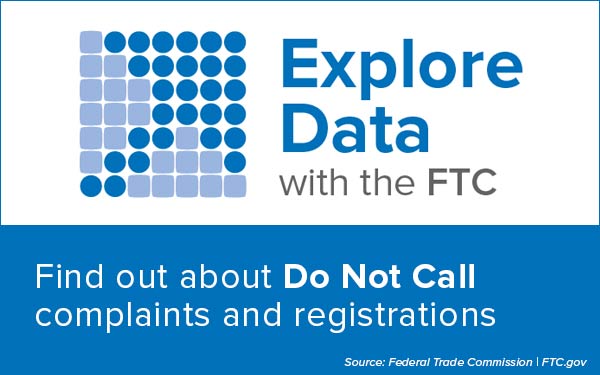The Federal Trade Commission issued its biennial report to Congress on the National Do Not Call (DNC) Registry that shows the number of consumers who have placed their telephone numbers on the Registry over the past two years has reached more than 249 million.
The report also notes that the FTC has received more than two million Do Not Call complaints in fiscal year (FY) 2023 with people overwhelmingly reporting these violations came via robocalls, as opposed to live telemarketing.
Imposter scam, medical needs and prescription scam calls led the list of commonly reported call topics in FY 2023, followed by calls related to reducing debt and energy, solar, and utilities. In response to the consistently high number of complaints from the public about impersonator scams, the FTC recently continued its rulemaking initiative to combat business and government impersonation fraud. A data spotlight issued in June 2023 found that bogus bank fraud warnings were the most common form of text message scam reported to the agency, and that many of the most common text scams impersonate well-known businesses.
The DNC Registry was created to provide consumers with a choice regarding whether or not to receive telemarketing calls. Accordingly, it is important that the FTC continue to work alongside the Federal Communications Commission to ensure that the Registry is effective and accessible for both consumers and telemarketers, the report notes. As new technology provides new challenges, both agencies actively seek to address and confront them by, among other things, encouraging private industry, other government agencies, academia, and other interested parties to create and develop new strategies to help consumers avoid unwanted telemarketing calls.
The FTC continues to track how technology affects the Registry and the consumers and telemarketers who access it. As a result of new technologies such as Voice over Internet Protocol (VoIP) services, callers, including law-breakers, are now able to make higher volumes of calls inexpensively from anywhere in the world. Technological developments also allow illegal telemarketers to fake, or “spoof,” the caller ID information that accompanies their calls, allowing them to conceal their identity from consumers. The report details how FTC’s law enforcement initiatives have evolved to keep up with these ever-changing technologies.
The report also includes updates on other DNC-related enforcement actions, including the pursuit of VoIP service providers who facilitate illegal calls through its Project point of No Entry, suits against platforms and soundboard technology providers, and July 2023’s Operation Stop Scam Calls, a coordinated sweep involving more than 180 actions brought by more than 100 federal and state law enforcement partners. Finally, the report details four public challenges the FTC has held to spur private-sector development of technological solutions that will help stop illegal robocalls.
Biennial Report Data
At the end of FY 2023, the DNC Registry had 249.5 million active registrations, an increase of more than 2.7 million from the previous fiscal year. According to the report, during FY 2022, 2,116 businesses and other entities paid more than $14.3 million to access the Registry and 1,963 entities paid Registry access fees totaling more than $14.9 million in FY 2023.
The Commission also publishes an annual Do Not Call Registry Data Book that provides substantial detail on registration numbers and other statistical information about the Registry. Similar information is also available the FTC’s Tableau public page, which is updated regularly and allows users to interact with the data to drill down to state or county data.
The Commission vote approving the report and its submission to Congress was 3-0.
The staff attorney on this matter is Ami Dziekan of the FTC’s Bureau of Consumer Protection.
Official news published at https://www.ftc.gov/news-events/news/press-releases/2024/01/ftc-issues-biennial-report-congress-national-do-not-call-registry


